Questions Every Business Should Ask Software Development Agencies


.avif)
Subscribe to our Newsletter
Choosing a software development agency isn’t just a technical decision, it’s a strategic one.
The right software development partner can accelerate growth, improve product quality, and bring clarity to even the most complex builds. But too often, businesses skip the hard questions and focus only on timelines and pricing.
If you want real alignment, you need deeper conversations. That means understanding how the agency thinks, communicates, and solves problems, not just how they code.
This guide covers the key questions that reveal whether a software development company can meet your expectations and support your long-term goals.
Read on to find out what to ask, what to listen for, and how to make a confident choice.

Questions to Verify Technical Expertise & Relevant Experience
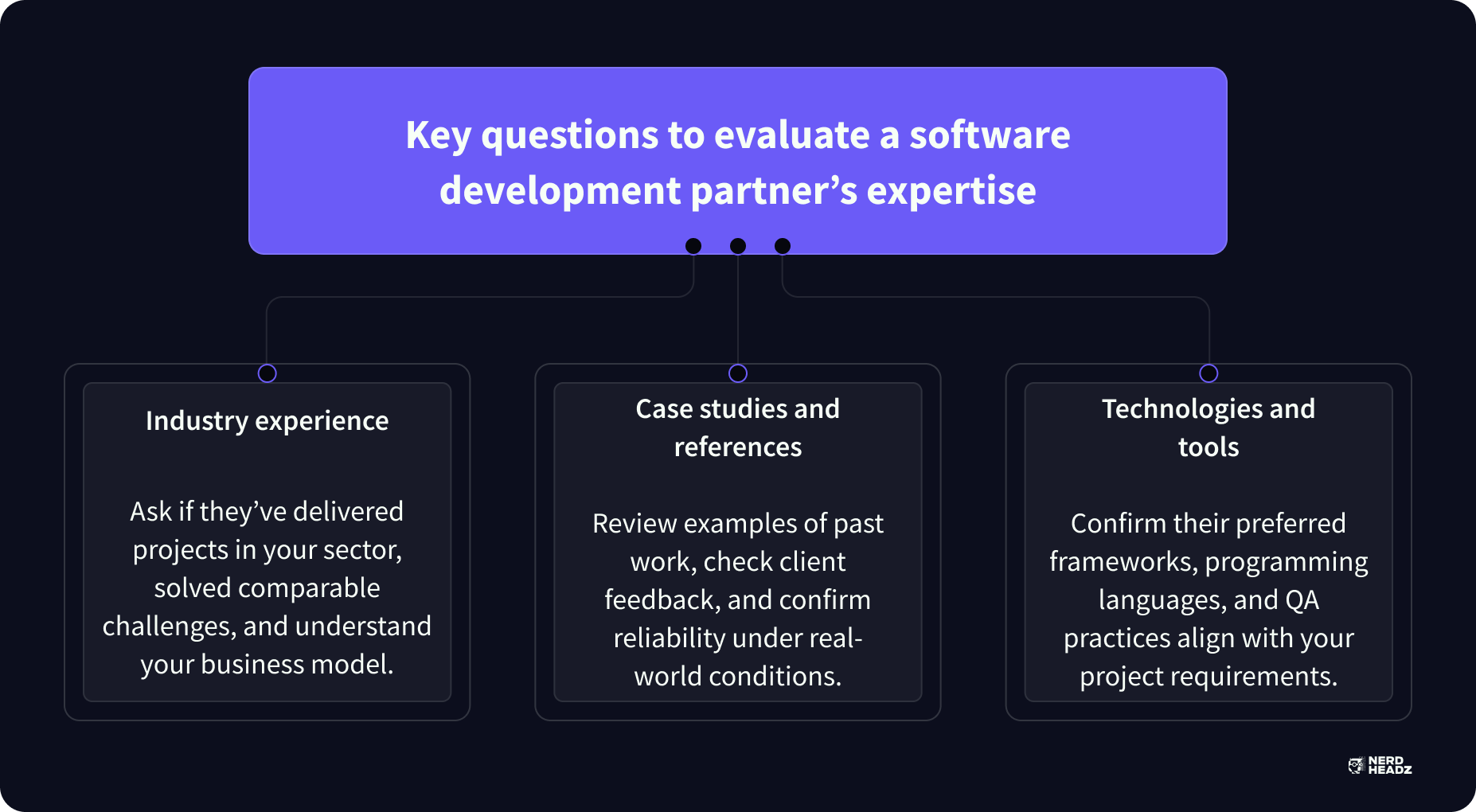
What is your experience in our industry or with similar projects?
Before hiring a software development agency, ask about their direct experience with businesses like yours.
Have they delivered similar software development services before? Do they understand the problems you’re solving or the users you're targeting?
This question helps you spot alignment early. A company that has completed projects within your industry will already understand your business model, potential risks, and technical priorities. It also gives insight into how well they handle specific project requirements, like integrations, compliance, or scalability.
You’re not just evaluating a software partner’s portfolio.
You’re checking if they’ve solved complex challenges that match your goals. That’s the difference between hiring developers and hiring the right development team for long-term success.
Can you provide case studies or client references?
Any software development company can list services, but real proof comes from the outcomes of their past projects.
Ask to review case studies or speak with previous clients. These stories reveal how the agency approaches project success, problem-solving, and client communication.
Look for examples that match your expectations in terms of scope, complexity, and tech stack.
Did they work under tight deadlines? Did their client-centric approach hold up during product pivots? How did they handle unexpected issues?
References also help you understand how closely the agency works with clients. Was there consistent collaboration? Were updates regular?
These are key indicators of how well the software development process will run once you begin.
What technologies and tools do you specialize in?
Every software development firm has its strengths, some focus on mobile apps, others on cloud computing or backend systems. Ask which technologies they work with most often and how those tools support your specific needs.
Dig into the programming languages, frameworks, and infrastructure they prefer.
Are they comfortable working with the platforms you already use? Do they suggest solutions aligned with your business strategy?
Also ask about project management tools and quality assurance practices. From task tracking to bug testing, these tools shape how efficiently the development process flows.
A clear answer here shows technical expertise, and helps you compare software outsourcing companies more objectively.
Questions to Confirm Delivery Method, Timelines & Communication
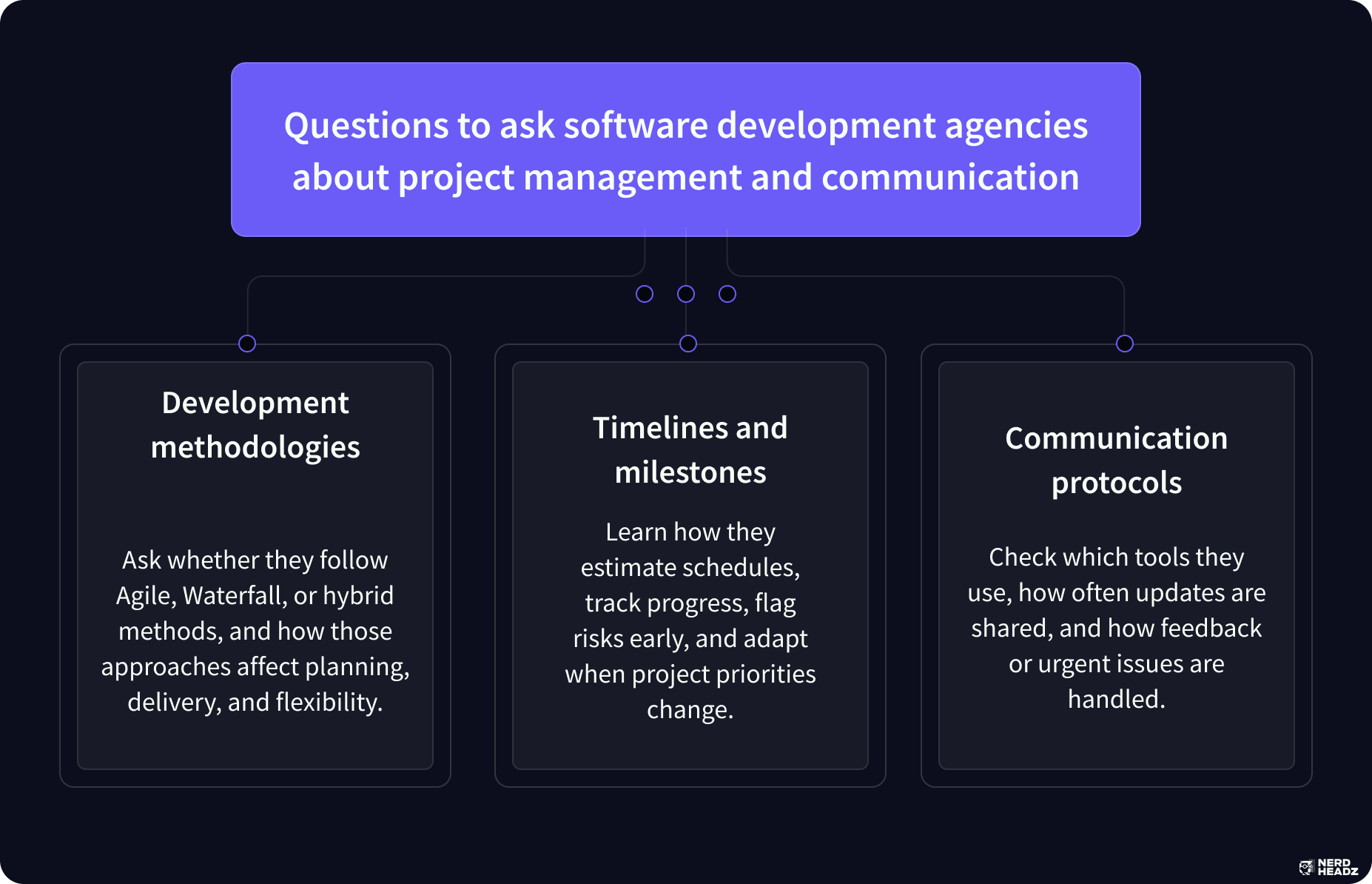
What development methodologies do you follow (e.g., Agile, Waterfall)?
A software development agency’s process directly impacts how your project will unfold. Methodologies like Agile or Waterfall form how the development team plans, builds, tests, and delivers.
Agile methodology supports frequent feedback loops, short sprints, and more flexibility. Waterfall follows a structured path, ideal when the project scope is fully defined from the start.
Some hybrid techniques blend elements from both.
Understanding their development process helps you match expectations. It shows how adaptable the agency is when changes happen and how often you'll get to review progress. This decision affects client involvement, delivery speed, and satisfaction with the final software product.
How do you handle project timelines and milestones?
Project success doesn’t depend solely on clean code; it relies on hitting the right milestones along the way. Ask how the agency plans, tracks, and adapts timelines during a software development project.
Experienced project managers will break the process into phases tied to key outcomes.
You should hear clear strategies to estimate project timelines, flag blockers early, and keep the work moving.
Some agencies offer fixed price milestones; others work hourly or by sprint. Ask about their approach and how they handle shifts in priorities. The ability to adjust without derailing delivery is a sign of a mature software development firm.
What communication tools and protocols do you use?
Communication builds trust and keeps custom software development projects on track. You’ll want to know what tools the team uses to stay in sync and how updates are shared.
Slack, Notion, Jira, and email are common, but tools alone aren’t enough.
Ask about their communication strategies. Do they schedule weekly standups? Will you have access to the full development team, or just a single point of contact?
Also clarify how project managers handle feedback, urgent changes, and routine check-ins. Software development services rely heavily on collaboration, and clear protocols help avoid misunderstandings. The smoother the exchange, the better the outcome.
Questions to Understand Team Structure, Roles & Resourcing
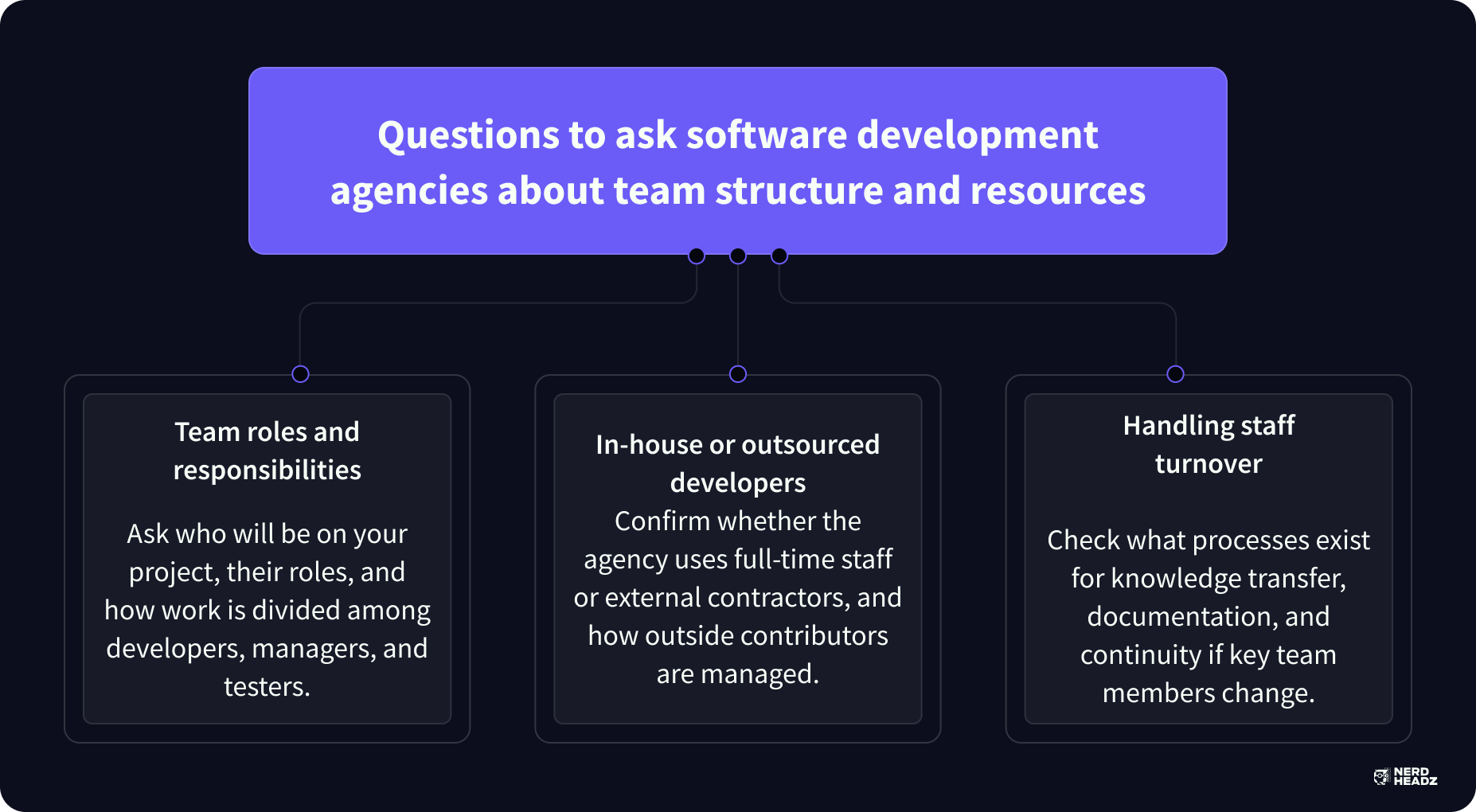
Who will be part of the development team, and what are their roles?
Before any code is written, ask who’s actually doing the work. A reliable software development agency should introduce the full team, not just the company name.
You’ll want to know how many developers are involved, and what each person owns. That includes frontend and backend engineers, project managers, quality assurance testers, and anyone else supporting the delivery.
This helps you track progress, give clear feedback, and prevent confusion down the line. If roles are vague, making decisions or holding anyone accountable is harder.
Strong teams operate with structure, and you should know who you’re trusting with your software project.
Are the developers in-house or outsourced?
Not every software development company builds with the same team. Some rely on in-house staff. Others outsource work to freelancers or offshore vendors.
Neither is wrong, but you should know who’s doing the work.
Ask if the developers are part of their full-time staff or brought in just for your project. It matters for consistency, collaboration, and how quickly issues are resolved.
If they use outside resources, ask how they’re managed. Are communication tools shared? Is code reviewed centrally? Software development services only work when everyone’s aligned, regardless of where they sit.
How do you handle staff turnover during a project?
People change roles. It happens. But how a development team handles transitions can protect, or derail, your momentum.
Ask how they plan for developer turnover.
Do they document work thoroughly? Can another engineer jump in without delay? What happens if your main contact leaves mid-project?
A dependable software development firm won’t leave you guessing. They’ll have handover plans, clear knowledge sharing, and project management tools in place to keep your build moving forward without interruption.
Questions to Clarify Pricing, Contracts & IP Ownership
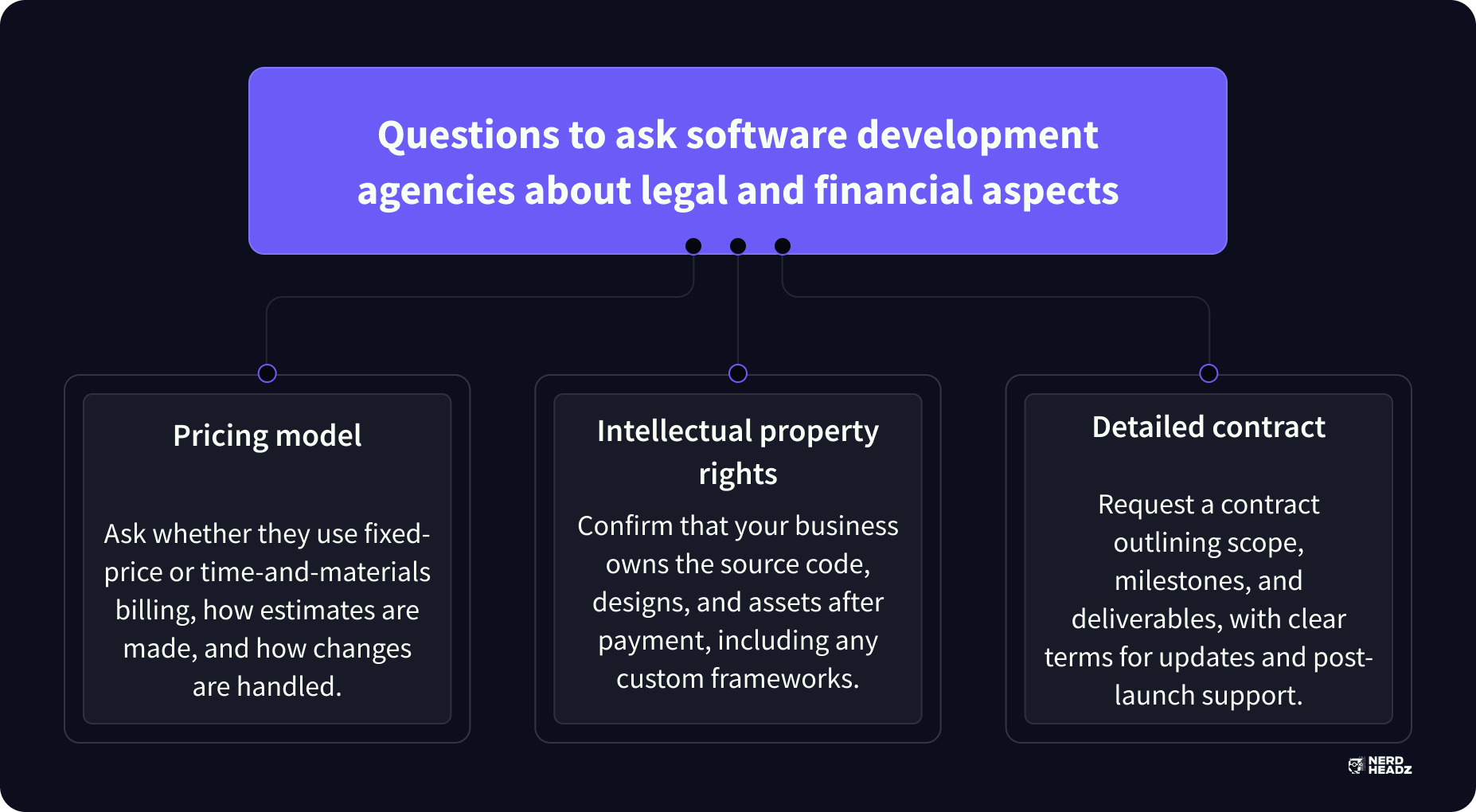
What is your pricing model (fixed, time and materials, etc.)?
Ask early how the agency charges for their work.
Software development costs vary based on how time, scope, and revisions are handled. Most agencies offer fixed-price or time-and-materials models, each of which has tradeoffs.
Fixed pricing works well when your software project has clearly defined features. Time-and-materials gives more flexibility if the scope might shift. Both models can work, but not knowing which one you’re agreeing to can lead to confusion mid-build.
Also ask about billing cycles, change requests, and how estimates are created.
A reliable software development company will walk you through how their pricing models match your timeline, your team, and your level of involvement.
Who owns the intellectual property rights of the developed software?
Intellectual property (IP) often gets overlooked, until it causes problems. Make sure you ask who owns the final product once it’s built.
For most custom software development projects, the client should retain full rights. But not every contract makes that clear.
Some software development firms hold onto ownership or reuse parts of the code elsewhere.
You need confirmation that the source code, designs, and any related assets become yours after payment. That includes any frameworks developed specifically for your platform. If the agency licenses tools or third-party components, ask how those rights are handled too.
Do you provide a detailed contract outlining scope, timelines, and deliverables?
A clear agreement keeps everyone accountable. Before any work starts, request a contract that includes your project scope, delivery stages, review points, and post-launch support terms.
This isn’t just about legal protection.
It’s how you track progress and prevent disputes. It also ensures alignment across the entire development team, especially when multiple roles are involved.
Ask a software development agency to explain their standard contract and its flexibility. Do they update it when your business needs change? Are timelines reviewed regularly?
A well-documented agreement is a sign of professionalism and a smoother development process.
Questions to Plan Support, Maintenance & Scalability
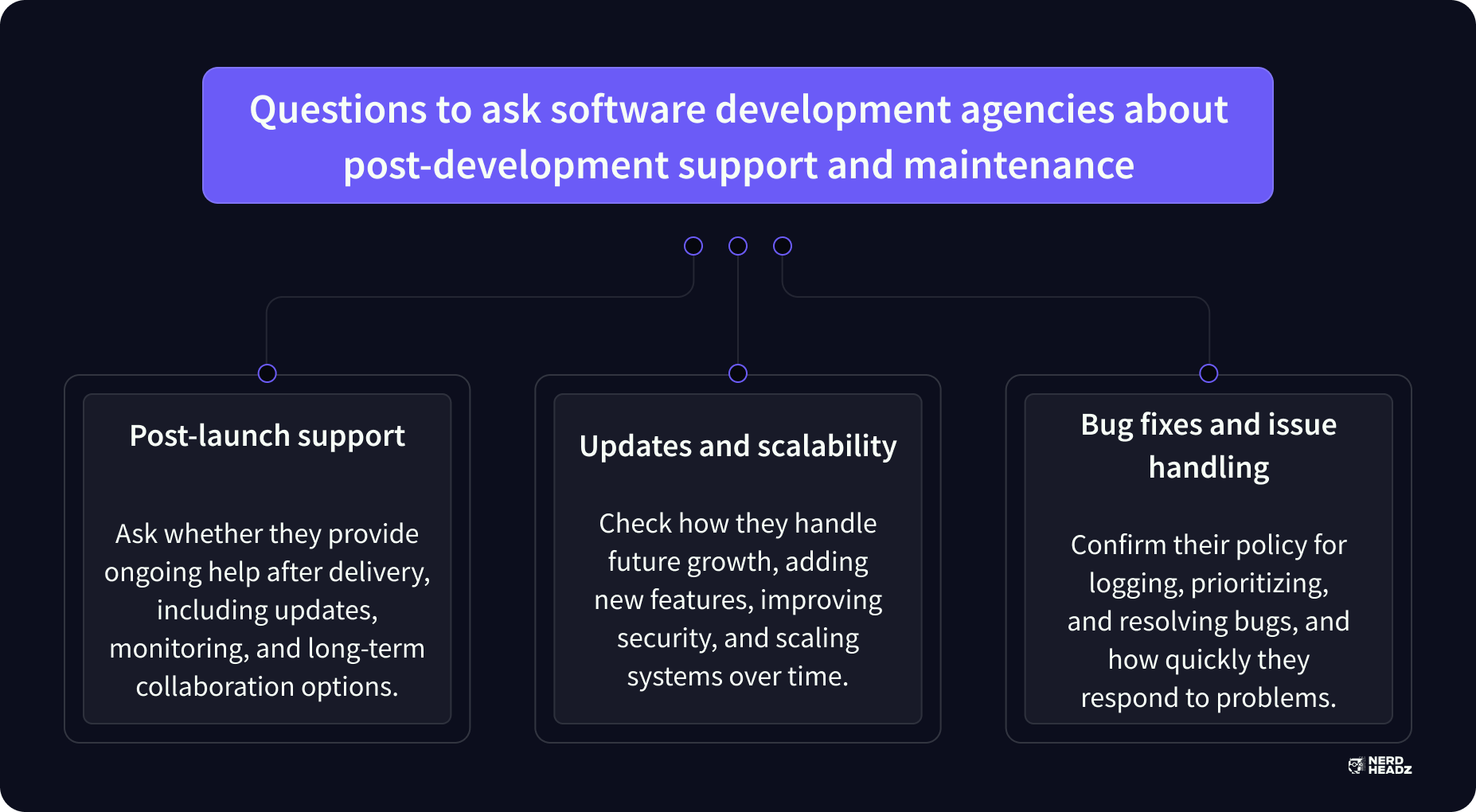
What support do you offer after the project is completed?
A successful software project doesn’t end at launch.
Ask what kind of post-launch support the agency offers. Will they stay involved once the product goes live? How do they handle updates, fixes, or performance monitoring?
A reliable software development company should offer clear options for ongoing support, either as part of the initial agreement or through separate maintenance services. That includes helping your team adjust, fix unexpected bugs, or plan future improvements.
Support plans also reflect how much the agency values long-term collaboration. If they disappear after delivery, that’s a red flag. Your software development team should be available to help your product grow, not just finish a checklist.
How do you handle software updates and scalability?
Every custom software project needs to grow. That’s why it’s important to ask how the agency manages long-term updates and prepares for growth.
Can their solution scale with new users, features, or security measures? Is the tech stack future-proof? Do they plan for mobile apps, integrations, or new data sources as part of the development process?
A mature software development agency will build with flexibility in mind.
They’ll create innovative systems that can expand without starting from scratch. This mindset impacts everything, from architecture to programming languages, and makes your investment stronger over time.
What is your policy on handling bugs or issues post-launch?
Even with rigorous testing, bugs happen. The real test is how the team responds when they do.
Ask how quickly issues are addressed, how they’re logged, and who you’ll contact if something breaks. Some agencies offer a grace period for bug fixes after launch. Others include long-term maintenance in their pricing models.
You should also ask if fixes are prioritized based on severity and how updates are delivered. Whether it’s a small UI bug or a bigger functionality issue, your software development firm should act fast, and keep you in the loop.
A strong post-launch policy shows the agency is invested in more than delivery. They’re committed to project success beyond day one.
Questions to Ensure Security, Compliance & Confidentiality
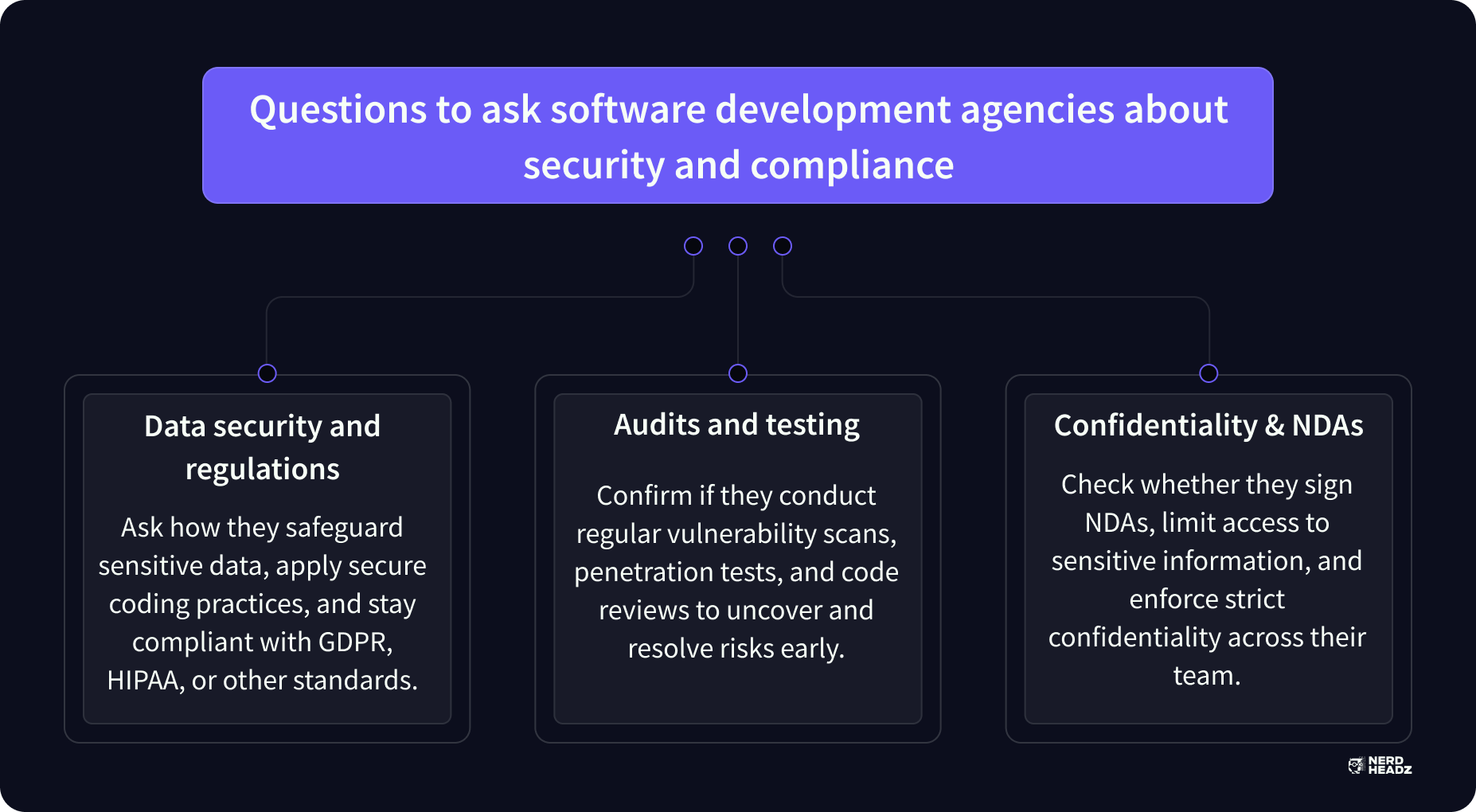
How do you ensure data security and compliance with regulations?
Security should be a priority from day one, not an afterthought. Ask how the software development company protects sensitive data throughout the development process.
You’ll want to know what security measures are built into their infrastructure and how they stay compliant with regulations like GDPR or HIPAA, depending on your industry. That includes encryption, access controls, and secure coding practices that prevent vulnerabilities from being introduced early.
A software development agency that takes compliance seriously will also guide you on legal obligations related to data storage, user consent, and breach response.
They’ll factor these requirements into your software project without adding friction to the user experience.
Do you conduct regular security audits and testing?
Security isn’t something you check once, it’s an ongoing part of delivering quality software. Ask if the agency runs regular audits, vulnerability scans, or penetration tests during and after development.
Testing isn’t just for peace of mind.
It helps uncover risks early and prevents costly issues down the road. From code review to third-party integrations, every part of the tech stack should be evaluated before launch.
A custom software development company that invests in audits is more likely to spot issues others miss. That level of diligence can mean the difference between a minor patch and a full-blown security breach.
How do you handle confidentiality and non-disclosure agreements?
Before sharing anything sensitive, confirm that the agency follows strict confidentiality protocols. That includes formal non-disclosure agreements (NDAs), limited-access documentation, and internal guidelines for sharing project details.
You’re trusting this team with business logic, internal systems, and possibly user data.
A professional software development firm should be comfortable signing NDAs and walking you through how that agreement is upheld day-to-day.
From freelance developers to full-time engineers, everyone involved should follow the same rules. This protects both your intellectual property and the relationship you’re building with your software partner.
Other Questions to Ask Custom Software Development Agencies Before Committing
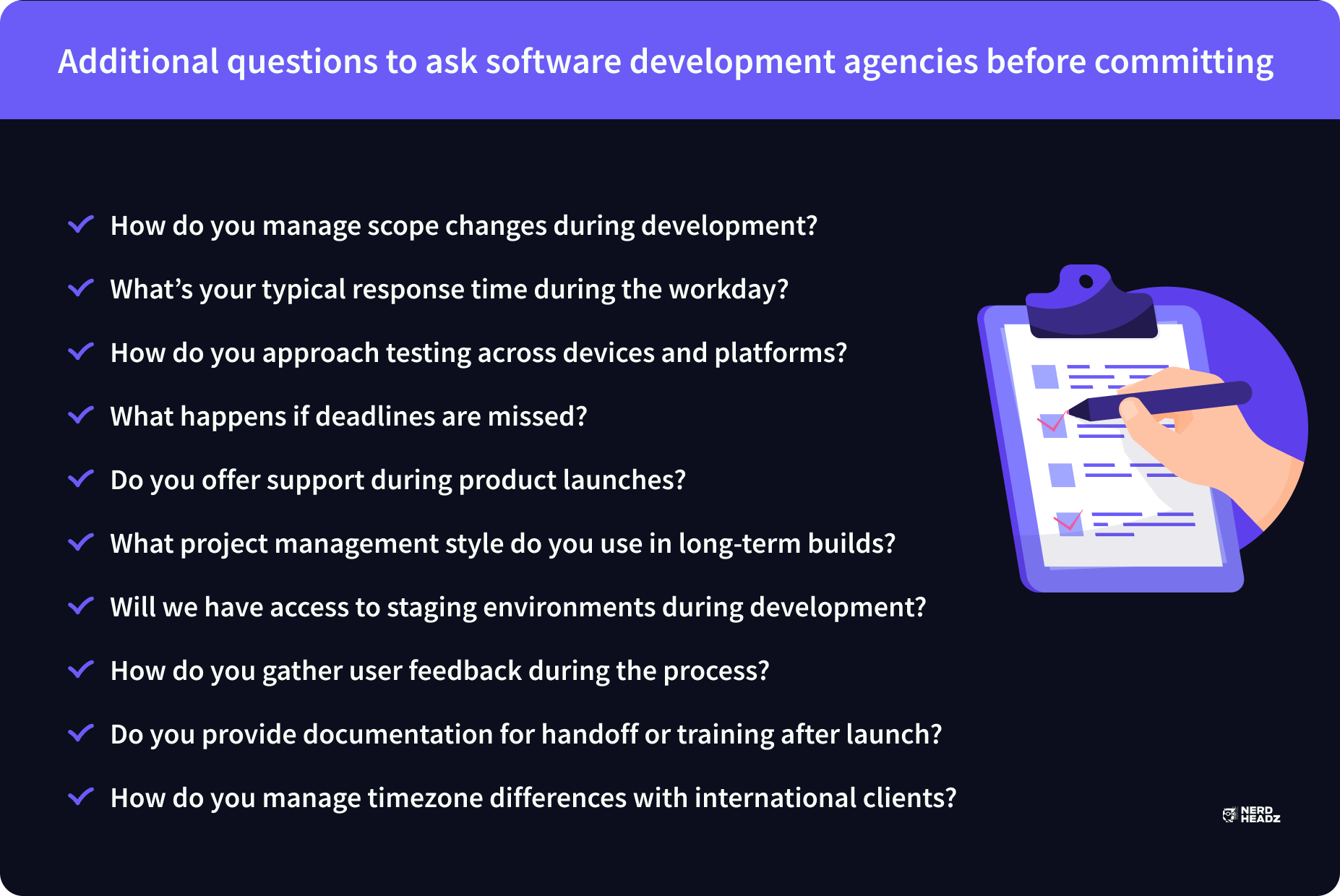
Even if the main areas are covered, technical skills, timelines, security, support, there are still a few details that can influence project success. These are often overlooked in early conversations but make a significant difference once development begins.
Asking the right follow-up questions helps you avoid assumptions and uncover how the agency works under pressure, adapts to changes, and handles everyday challenges.
Here are a few more questions worth asking before you sign any agreement:
- How do you manage scope changes during development?
- What’s your typical response time during the workday?
- How do you approach testing across different devices or platforms?
- What happens if deadlines are missed?
- Do you offer support during product launches?
- What project management style do you prefer in long-term builds?
- Will we have access to staging environments during development?
- How do you gather user feedback during the process?
- Do you provide documentation for handoff or training after launch?
- How do you manage timezone differences with international clients?
These questions help clarify how the software development team operates on a day-to-day level, and give you more confidence in how they’ll handle your software project from start to finish.
Conclusion
Asking the right questions doesn’t just prevent mistakes, it sets the foundation for a stronger, more collaborative relationship. From day-to-day communication to long-term support, every detail matters when selecting a custom software development partner.
Use these questions to dig deeper into each agency’s experience, structure, and working style. The more clarity you get upfront, the smoother your project will run later.
Ready to find a software development partner that meets your needs? Contact NerdHeadz today to discuss your project requirements.
Frequently asked questions
Why is it important to ask questions before hiring a software development agency?

Asking the right questions helps ensure the agency aligns with your business goals, has the necessary expertise, and can deliver quality results within your timeline and budget.
What are the risks of not thoroughly vetting a software development company?

Without proper vetting, you risk project delays, budget overruns, subpar quality, and misalignment with your business objectives.
How can I assess a software development agency's technical capabilities?

Inquire about their previous projects, technology stack, development methodologies, and request case studies or client references to evaluate their expertise.
What should I know about post-launch support from a development agency?

Understand their maintenance and support policies, including response times, update schedules, and how they handle bug fixes or feature improvements after deployment.

Luciani Woestemeier
Luciani Zorrilla is a content marketer with experience in sales development, outbound sales, SEO, design, email marketing, and UX. She stands out in driving sustainable growth for tech startups through impactful SEO strategies and leading results-oriented marketing teams.
Related Articles
Subscribe to our Newsletter
.webp)
.webp)
Are you ready to talk about your project?
Schedule a consultation with our team, and we’ll send a custom proposal.


Choosing a software development agency isn’t just a technical decision, it’s a strategic one.
The right software development partner can accelerate growth, improve product quality, and bring clarity to even the most complex builds. But too often, businesses skip the hard questions and focus only on timelines and pricing.
If you want real alignment, you need deeper conversations. That means understanding how the agency thinks, communicates, and solves problems, not just how they code.
This guide covers the key questions that reveal whether a software development company can meet your expectations and support your long-term goals.
Read on to find out what to ask, what to listen for, and how to make a confident choice.

Questions to Verify Technical Expertise & Relevant Experience

What is your experience in our industry or with similar projects?
Before hiring a software development agency, ask about their direct experience with businesses like yours.
Have they delivered similar software development services before? Do they understand the problems you’re solving or the users you're targeting?
This question helps you spot alignment early. A company that has completed projects within your industry will already understand your business model, potential risks, and technical priorities. It also gives insight into how well they handle specific project requirements, like integrations, compliance, or scalability.
You’re not just evaluating a software partner’s portfolio.
You’re checking if they’ve solved complex challenges that match your goals. That’s the difference between hiring developers and hiring the right development team for long-term success.
Can you provide case studies or client references?
Any software development company can list services, but real proof comes from the outcomes of their past projects.
Ask to review case studies or speak with previous clients. These stories reveal how the agency approaches project success, problem-solving, and client communication.
Look for examples that match your expectations in terms of scope, complexity, and tech stack.
Did they work under tight deadlines? Did their client-centric approach hold up during product pivots? How did they handle unexpected issues?
References also help you understand how closely the agency works with clients. Was there consistent collaboration? Were updates regular?
These are key indicators of how well the software development process will run once you begin.
What technologies and tools do you specialize in?
Every software development firm has its strengths, some focus on mobile apps, others on cloud computing or backend systems. Ask which technologies they work with most often and how those tools support your specific needs.
Dig into the programming languages, frameworks, and infrastructure they prefer.
Are they comfortable working with the platforms you already use? Do they suggest solutions aligned with your business strategy?
Also ask about project management tools and quality assurance practices. From task tracking to bug testing, these tools shape how efficiently the development process flows.
A clear answer here shows technical expertise, and helps you compare software outsourcing companies more objectively.
Questions to Confirm Delivery Method, Timelines & Communication

What development methodologies do you follow (e.g., Agile, Waterfall)?
A software development agency’s process directly impacts how your project will unfold. Methodologies like Agile or Waterfall form how the development team plans, builds, tests, and delivers.
Agile methodology supports frequent feedback loops, short sprints, and more flexibility. Waterfall follows a structured path, ideal when the project scope is fully defined from the start.
Some hybrid techniques blend elements from both.
Understanding their development process helps you match expectations. It shows how adaptable the agency is when changes happen and how often you'll get to review progress. This decision affects client involvement, delivery speed, and satisfaction with the final software product.
How do you handle project timelines and milestones?
Project success doesn’t depend solely on clean code; it relies on hitting the right milestones along the way. Ask how the agency plans, tracks, and adapts timelines during a software development project.
Experienced project managers will break the process into phases tied to key outcomes.
You should hear clear strategies to estimate project timelines, flag blockers early, and keep the work moving.
Some agencies offer fixed price milestones; others work hourly or by sprint. Ask about their approach and how they handle shifts in priorities. The ability to adjust without derailing delivery is a sign of a mature software development firm.
What communication tools and protocols do you use?
Communication builds trust and keeps custom software development projects on track. You’ll want to know what tools the team uses to stay in sync and how updates are shared.
Slack, Notion, Jira, and email are common, but tools alone aren’t enough.
Ask about their communication strategies. Do they schedule weekly standups? Will you have access to the full development team, or just a single point of contact?
Also clarify how project managers handle feedback, urgent changes, and routine check-ins. Software development services rely heavily on collaboration, and clear protocols help avoid misunderstandings. The smoother the exchange, the better the outcome.
Questions to Understand Team Structure, Roles & Resourcing

Who will be part of the development team, and what are their roles?
Before any code is written, ask who’s actually doing the work. A reliable software development agency should introduce the full team, not just the company name.
You’ll want to know how many developers are involved, and what each person owns. That includes frontend and backend engineers, project managers, quality assurance testers, and anyone else supporting the delivery.
This helps you track progress, give clear feedback, and prevent confusion down the line. If roles are vague, making decisions or holding anyone accountable is harder.
Strong teams operate with structure, and you should know who you’re trusting with your software project.
Are the developers in-house or outsourced?
Not every software development company builds with the same team. Some rely on in-house staff. Others outsource work to freelancers or offshore vendors.
Neither is wrong, but you should know who’s doing the work.
Ask if the developers are part of their full-time staff or brought in just for your project. It matters for consistency, collaboration, and how quickly issues are resolved.
If they use outside resources, ask how they’re managed. Are communication tools shared? Is code reviewed centrally? Software development services only work when everyone’s aligned, regardless of where they sit.
How do you handle staff turnover during a project?
People change roles. It happens. But how a development team handles transitions can protect, or derail, your momentum.
Ask how they plan for developer turnover.
Do they document work thoroughly? Can another engineer jump in without delay? What happens if your main contact leaves mid-project?
A dependable software development firm won’t leave you guessing. They’ll have handover plans, clear knowledge sharing, and project management tools in place to keep your build moving forward without interruption.
Questions to Clarify Pricing, Contracts & IP Ownership

What is your pricing model (fixed, time and materials, etc.)?
Ask early how the agency charges for their work.
Software development costs vary based on how time, scope, and revisions are handled. Most agencies offer fixed-price or time-and-materials models, each of which has tradeoffs.
Fixed pricing works well when your software project has clearly defined features. Time-and-materials gives more flexibility if the scope might shift. Both models can work, but not knowing which one you’re agreeing to can lead to confusion mid-build.
Also ask about billing cycles, change requests, and how estimates are created.
A reliable software development company will walk you through how their pricing models match your timeline, your team, and your level of involvement.
Who owns the intellectual property rights of the developed software?
Intellectual property (IP) often gets overlooked, until it causes problems. Make sure you ask who owns the final product once it’s built.
For most custom software development projects, the client should retain full rights. But not every contract makes that clear.
Some software development firms hold onto ownership or reuse parts of the code elsewhere.
You need confirmation that the source code, designs, and any related assets become yours after payment. That includes any frameworks developed specifically for your platform. If the agency licenses tools or third-party components, ask how those rights are handled too.
Do you provide a detailed contract outlining scope, timelines, and deliverables?
A clear agreement keeps everyone accountable. Before any work starts, request a contract that includes your project scope, delivery stages, review points, and post-launch support terms.
This isn’t just about legal protection.
It’s how you track progress and prevent disputes. It also ensures alignment across the entire development team, especially when multiple roles are involved.
Ask a software development agency to explain their standard contract and its flexibility. Do they update it when your business needs change? Are timelines reviewed regularly?
A well-documented agreement is a sign of professionalism and a smoother development process.
Questions to Plan Support, Maintenance & Scalability

What support do you offer after the project is completed?
A successful software project doesn’t end at launch.
Ask what kind of post-launch support the agency offers. Will they stay involved once the product goes live? How do they handle updates, fixes, or performance monitoring?
A reliable software development company should offer clear options for ongoing support, either as part of the initial agreement or through separate maintenance services. That includes helping your team adjust, fix unexpected bugs, or plan future improvements.
Support plans also reflect how much the agency values long-term collaboration. If they disappear after delivery, that’s a red flag. Your software development team should be available to help your product grow, not just finish a checklist.
How do you handle software updates and scalability?
Every custom software project needs to grow. That’s why it’s important to ask how the agency manages long-term updates and prepares for growth.
Can their solution scale with new users, features, or security measures? Is the tech stack future-proof? Do they plan for mobile apps, integrations, or new data sources as part of the development process?
A mature software development agency will build with flexibility in mind.
They’ll create innovative systems that can expand without starting from scratch. This mindset impacts everything, from architecture to programming languages, and makes your investment stronger over time.
What is your policy on handling bugs or issues post-launch?
Even with rigorous testing, bugs happen. The real test is how the team responds when they do.
Ask how quickly issues are addressed, how they’re logged, and who you’ll contact if something breaks. Some agencies offer a grace period for bug fixes after launch. Others include long-term maintenance in their pricing models.
You should also ask if fixes are prioritized based on severity and how updates are delivered. Whether it’s a small UI bug or a bigger functionality issue, your software development firm should act fast, and keep you in the loop.
A strong post-launch policy shows the agency is invested in more than delivery. They’re committed to project success beyond day one.
Questions to Ensure Security, Compliance & Confidentiality

How do you ensure data security and compliance with regulations?
Security should be a priority from day one, not an afterthought. Ask how the software development company protects sensitive data throughout the development process.
You’ll want to know what security measures are built into their infrastructure and how they stay compliant with regulations like GDPR or HIPAA, depending on your industry. That includes encryption, access controls, and secure coding practices that prevent vulnerabilities from being introduced early.
A software development agency that takes compliance seriously will also guide you on legal obligations related to data storage, user consent, and breach response.
They’ll factor these requirements into your software project without adding friction to the user experience.
Do you conduct regular security audits and testing?
Security isn’t something you check once, it’s an ongoing part of delivering quality software. Ask if the agency runs regular audits, vulnerability scans, or penetration tests during and after development.
Testing isn’t just for peace of mind.
It helps uncover risks early and prevents costly issues down the road. From code review to third-party integrations, every part of the tech stack should be evaluated before launch.
A custom software development company that invests in audits is more likely to spot issues others miss. That level of diligence can mean the difference between a minor patch and a full-blown security breach.
How do you handle confidentiality and non-disclosure agreements?
Before sharing anything sensitive, confirm that the agency follows strict confidentiality protocols. That includes formal non-disclosure agreements (NDAs), limited-access documentation, and internal guidelines for sharing project details.
You’re trusting this team with business logic, internal systems, and possibly user data.
A professional software development firm should be comfortable signing NDAs and walking you through how that agreement is upheld day-to-day.
From freelance developers to full-time engineers, everyone involved should follow the same rules. This protects both your intellectual property and the relationship you’re building with your software partner.
Other Questions to Ask Custom Software Development Agencies Before Committing

Even if the main areas are covered, technical skills, timelines, security, support, there are still a few details that can influence project success. These are often overlooked in early conversations but make a significant difference once development begins.
Asking the right follow-up questions helps you avoid assumptions and uncover how the agency works under pressure, adapts to changes, and handles everyday challenges.
Here are a few more questions worth asking before you sign any agreement:
- How do you manage scope changes during development?
- What’s your typical response time during the workday?
- How do you approach testing across different devices or platforms?
- What happens if deadlines are missed?
- Do you offer support during product launches?
- What project management style do you prefer in long-term builds?
- Will we have access to staging environments during development?
- How do you gather user feedback during the process?
- Do you provide documentation for handoff or training after launch?
- How do you manage timezone differences with international clients?
These questions help clarify how the software development team operates on a day-to-day level, and give you more confidence in how they’ll handle your software project from start to finish.
Conclusion
Asking the right questions doesn’t just prevent mistakes, it sets the foundation for a stronger, more collaborative relationship. From day-to-day communication to long-term support, every detail matters when selecting a custom software development partner.
Use these questions to dig deeper into each agency’s experience, structure, and working style. The more clarity you get upfront, the smoother your project will run later.
Ready to find a software development partner that meets your needs? Contact NerdHeadz today to discuss your project requirements.

Luciani Zorrilla is a content marketer with experience in sales development, outbound sales, SEO, design, email marketing, and UX. She stands out in driving sustainable growth for tech startups through impactful SEO strategies and leading results-oriented marketing teams.

%201.svg)

%201.svg)
%201.webp)

%201.webp)








